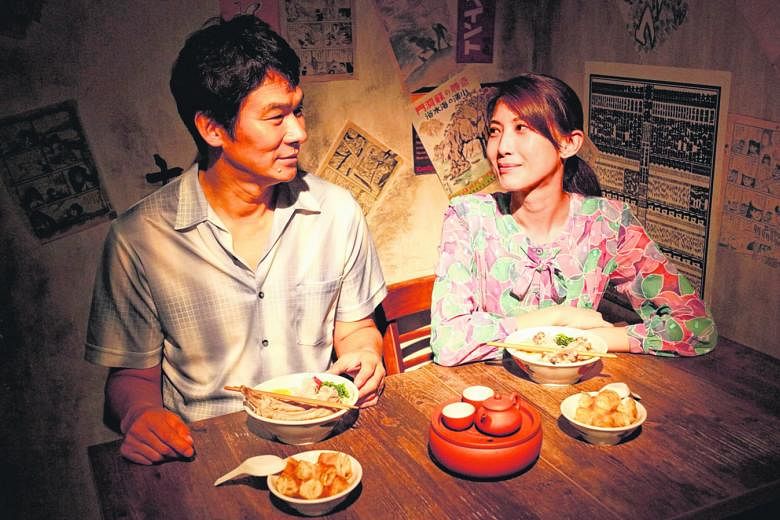The movie Ramen Teh is Singapore's most foodie-friendly feature film yet.
Woven into the story of a young Japanese chef trying to connect with his Singapore family are scenes in which he discovers local cuisine.
There are lingering shots of chilli crab, fried bee hoon, chicken curry, steamed egg and, of course, the dishes at the centre of the movie - bak kut teh, or pork rib soup, and ramen.
It is one of those films that drive audiences, their mouths watering, straight from the cinema to the restaurant and director Eric Khoo makes no apologies for it.
He says he had more sensuous food footage that did not make the cut because of time.
"I don't have my mee siam in there," he tells The Straits Times, sounding disappointed.
The 52-year-old is one of Singapore's most celebrated film-makers. His work has been shown in major festivals, from the Cannes Film Festival (Tatsumi, 2011; Be With Me, 2005; 12 Storeys, 1997) to the Venice Film Festival (Mee Pok Man, 1995).
Ramen Teh has its Singapore gala premiere tonight and opens in cinemas next Thursday.
Food has always been a strong presence in his stories, beginning with his first feature, the horror-satire Mee Pok Man, named after the noodle-seller title character, played by Joe Ng. There are shots of Ng cooking the dish, a skill the actor picked up for the sake of authenticity.
Khoo's last work, the 71-minute film Wanton Mee (2016), takes the point of view of a jaded journalist whose soul is stirred when he starts discovering the origins and methods of preparing the noodle dish.
Watching how food connects with characters can be a powerfully moving experience - and not just because it makes stomachs growl, says the director.
He recalls interesting reactions from European journalists after the film screened at the Berlin Film Festival's Culinary Cinema section in January this year.
"They talked to me about their mothers' pudding. They were dying watching the film, because it made them want to eat, but they also wanted to reconnect with their mothers and grandmothers' cooking."
The dishes shown are not as important as how they point out the associations between food and the folks people love, he says. "It's all about memories and good flavours."
The film, a Singapore-Japan-France co-production, got its start when Japanese co-producer Yutaka Tachibana suggested a movie to mark five decades of friendship between Singapore and Japan.
Khoo imagined a story about food and maternal love.
"It's a personal film. A lot of it is about how much I've missed my mother's cooking since she passed away - it's about home fare and the love that goes into it."
The film's title is a portmanteau of ramen and bak kut teh. It is the name given to the dish in the film, created by ramen chef Masato (Japanese heart-throb Takumi Saitoh) to symbolise the union of his Singaporean and Japanese sides.
Khoo says his team had to test if the concept of ramen noodles and toppings in bak kut teh broth would work. "We weren't going to embark on the film if the thing tasted bad," he says.
Keisuke Takeda, founder of Singapore ramen chain Ramen Keisuke, created a version that tasted good.
"It's based on the Teochew-style broth, which has a cleaner taste than the Hokkien-style one," says Khoo.
In the film, Masato hails from the city of Takasaki, a city just over 100km north of Tokyo. For much of his life, the subject of his dead Singaporean mother Mei Lian (Jeanette Aw) has been taboo.
He eventually visits Singapore, where he meets Japanese expatriate Miki (pop idol Seiko Matsuda) and connects with the food and family of his mother's homeland.
In a film that would otherwise be serious, local actor Mark Lee provides a comedic counterweight, a contribution that Khoo values. "He is crucial," says the film-maker.
Lee plays Wee, Masato's uncle in Singapore. In one scene, the talkative man shows the stoic Masato how to make bak kut teh.
Khoo feels the scene shows off their odd-couple chemistry. "Our French producers love Mark and, in Germany, the audiences were laughing out loud," he says.
Saitoh, 36, says that Lee is "like a brother", and during breaks in filming, was made to feel welcome by him and his wife, who took him out to eat frequently.
"I'm already making a list of restaurants to take Mark and his wife when they come to Japan," he says. He was speaking at a press event last year marking the end of principal photography for the film.
The actor, who has appeared in movies such as 13 Assassins (2010) and the romantic drama Hirugao (2017), is an avid home cook and his parents are chefs, so the film's themes of food and family bonds struck a chord with him, he says.
He has since added bak kut teh to his repertoire of dishes to make at home, he quips. It comes in fourth on his list of go-to dishes, after paella, onion gratin soup and udon noodle soup.
His favourite discovery in Singapore is chicken rice - not the dish itself, but the sweet dark soya sauce that accompanies it. "I could eat that with plain rice, forever," he says.
• Ramen Teh opens in cinemas next Thursday.


